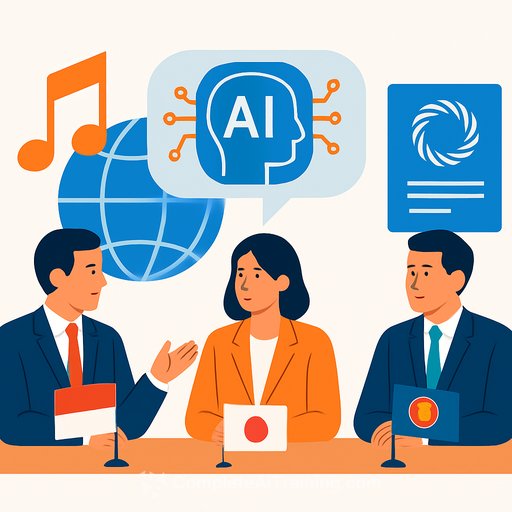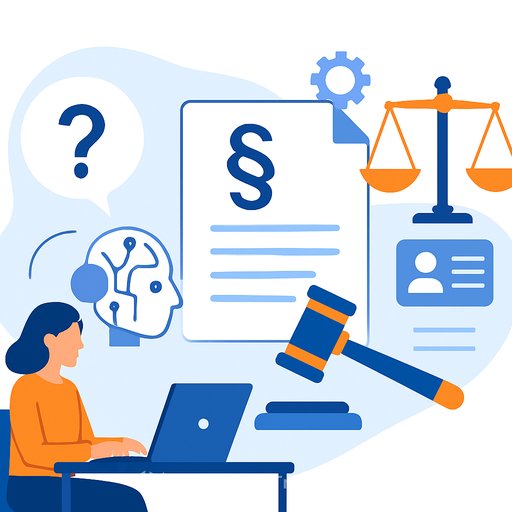ASEAN-Japan law ministers weigh AI royalties; Indonesia pushes binding instrument
Indonesia has proposed a special ASEAN-Japan meeting focused on music royalties and AI on digital platforms. The proposal surfaced at the first ASEAN-Japan Ministers of Law Meeting in Manila, signaling a clear push to close royalty gaps created by AI-generated and AI-distributed content.
Law Minister Supratman Agtas called for a dedicated workshop on intellectual property, centered on how royalties should flow when global AI platforms generate or distribute music and media. The message is simple: creators need to be paid, and platforms need a workable rulebook.
Why this matters for in-house counsel and law firms
AI tools are already ingesting, remixing, and distributing content at scale. Without a shared framework, royalty obligations are inconsistent across platforms and borders, and enforcement is slow.
Clients will ask two questions: What do we owe, and what are we exposed to? This initiative points toward answers that could become regional norms-and influence global practice.
Inside "The Indonesian Proposal"
Indonesia is preparing a document for discussion at the WIPO Standing Committee on Copyright and Related Rights (SCCR) in Geneva this December. The official title: The Indonesian Proposal for a Legally Binding Instrument on the Governance of Copyright Royalty in the Digital Environment.
Core intent: create enforceable rules so creators and the creative industry are compensated fairly when AI platforms generate or distribute protected works. Expect debate on definitions (generated vs. facilitated), allocation methods, and cross-border collection and payout.
For context on SCCR's role, see WIPO's overview of the committee's work: WIPO SCCR.
ASEAN-Japan cooperation: beyond royalties
The meeting reaffirmed cooperation on civil and commercial law development, along with support for the ASEAN-Japan work plan. Japan's Minister of Justice, Hiroshi Hiraguchi, tabled initiatives across law and justice, criminal justice, and IP seminars-seen as priority tracks for the region.
This signals continued alignment between ASEAN and Japan on rulemaking and capacity-building. Background on the partnership: ASEAN-Japan relations.
What legal teams should do now
- Audit contracts: Add clear clauses on AI training, AI-generated outputs, and distribution on third-party platforms. Separate rights and royalties for training, generation, and dissemination.
- Map royalty flows: Identify which rights are triggered (reproduction, communication to the public, mechanical, neighboring) for AI-assisted vs. AI-generated uses.
- Update licensing playbooks: Include standard terms for metadata, watermarking, audit rights, and usage reporting by AI vendors and platforms.
- Engage CMOs early: Coordinate with collective management organizations on tracking, identification, and cross-border payout mechanisms for AI-related uses.
- Prepare for SCCR: Brief executives on likely scenarios (voluntary codes vs. binding instrument). Assign a policy lead to monitor December outcomes.
- Balance risk and opportunity: For clients building AI tools, draft compliance checklists covering training data provenance, opt-outs, transparency, and dispute resolution.
Key issues to watch
- Definitions: How law and policy distinguish AI-generated, AI-assisted, and platform-facilitated content-and which rights attach to each.
- Attribution and reporting: Whether platforms must disclose training sources, model usage, and content lineage to enable calculation of royalties.
- Liability allocation: Platform vs. developer vs. uploader liability, safe harbors, and notice-and-takedown standards adapted for AI workflows.
- Rate-setting and governance: If a binding instrument advances, who sets rates, how disputes are handled, and how data is verified.
- Cross-border enforcement: Recognition and enforcement across ASEAN and Japan, especially where content crosses multiple jurisdictions in minutes.
Practical drafting notes
- Insert AI-specific definitions and scopes of use. Tie royalty triggers to identifiable events (training, generation, hosting, distribution).
- Require machine-readable identifiers and usage logs to support royalty calculation and audits.
- Include indemnities proportionate to control over the AI pipeline, not just end-user actions.
- Set transparent dispute timelines and escalation paths to reduce takedown and payout delays.
What this could change
If ASEAN and Japan align on a framework and WIPO gains momentum, platforms may face standardized reporting and payout obligations for AI-related uses. For rights holders, this could mean clearer revenue streams and stronger leverage in negotiations.
For product and AI teams, it raises the bar on transparency, rights clearance, and data governance. For counsel, it's time to update playbooks and get policy-ready.
Upskilling for the AI-IP shift
If you're building internal guidance or training your team, a quick way to get everyone baseline-ready is to review current AI curricula by role: AI courses by job role. It helps align product, legal, and compliance on the same practical model of risk and control.
Your membership also unlocks:





